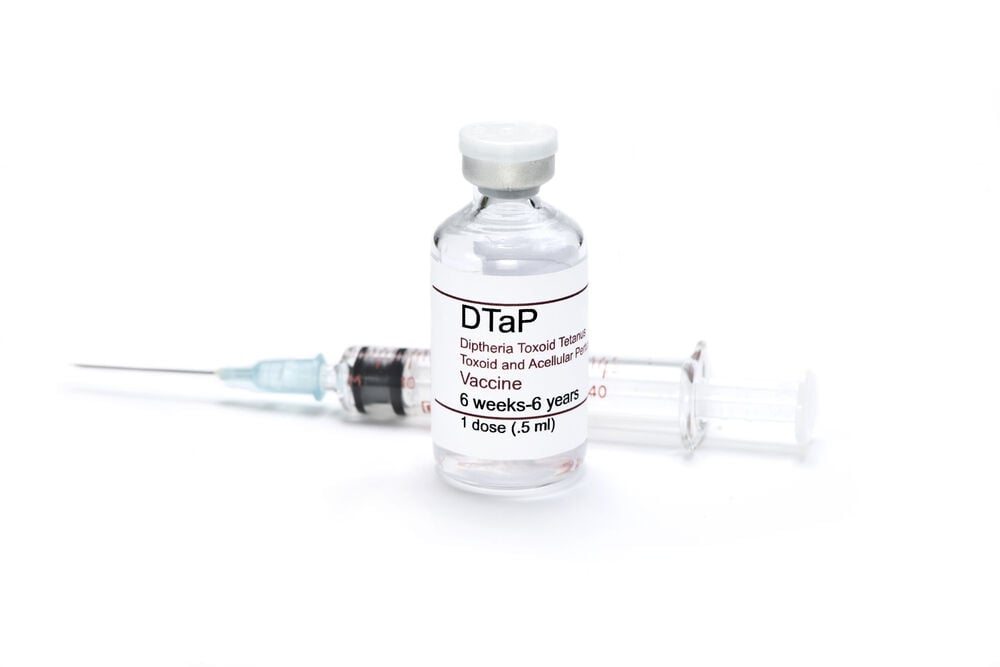-
Tracking cycle
-
Getting pregnant
-
Pregnancy
-
Help Center
-
Flo for Partners
-
Anonymous Mode
-
Flo app reviews
-
Flo Premium New
-
Secret Chats New
-
Symptom Checker New
-
Your cycle
-
Health 360°
-
Getting pregnant
-
Pregnancy
-
Being a mom
-
LGBTQ+
-
Quizzes
-
Ovulation calculator
-
hCG calculator
-
Pregnancy test calculator
-
Menstrual cycle calculator
-
Period calculator
-
Implantation calculator
-
Pregnancy weeks to months calculator
-
Pregnancy due date calculator
-
IVF and FET due date calculator
-
Due date calculator by ultrasound
-
Medical Affairs
-
Science & Research
-
Pass It On Project New
-
Privacy Portal
-
Press Center
-
Flo Accuracy
-
Careers
-
Contact Us
9-Month Vaccines: Why Immunization Is Vital


Every piece of content at Flo Health adheres to the highest editorial standards for language, style, and medical accuracy. To learn what we do to deliver the best health and lifestyle insights to you, check out our content review principles.
Vaccines prevent infection by introducing a tiny amount of killed or weakened bacteria or virus (or sometimes lab-grown protein) into your baby's immune system. When your baby receives an immunization, they get injected with that disease in a weakened form. This triggers your baby's immune response, either producing antibodies against that specific disease or kicking off other processes to enhance immunity. Then if your baby is exposed to the disease in the future, their immune system is ready to fight it.
Vaccines for 9-month-old babies are important because they protect against a wide variety of serious illnesses. They also prevent these diseases from spreading to other children. Vaccines help prevent illnesses and also decrease their severity. Moreover, preventing a disease is much easier and more cost-effective than treating it. Thanks to vaccines, diseases such as mumps, whooping cough, and measles are much less common than they used to be. Furthermore, because of vaccines, other diseases such as smallpox and polio have been nearly eradicated.
Most common 9-month vaccines
Vaccines help decrease the risk of infection, working with your baby's natural defenses and helping them develop immunity to a particular disease. It is very important to keep an up-to-date record of vaccinations. This helps you keep track of which vaccines your child has received and which ones they'll get next. The following is a list of vaccines that your 9-month-old child should receive:
Polio vaccine
Polio, also referred to as poliomyelitis, is a severe illness that results from infection by the poliovirus. The contagious infection can affect the spinal cord and brain, resulting in paralysis. While no cure exists for the disease, the polio vaccine can prevent its occurrence. Children in the United States receive the inactivated poliovirus vaccine (IPV). The Centers for Disease Control and Prevention (CDC) state that the polio vaccine should be given to babies at these ages:
- 2 months
- 4 months
- 6 to 18 months
- 4 to 6 years
The polio vaccine can cause very mild side effects that resolve within a couple of days. Some of the most common side effects are:
- A low-grade fever
- Redness at the injection site
- Soreness at the injection site
Influenza vaccine
Hemophilus influenza type B results from infection by bacteria. It usually affects children younger than 5 years old. The Hib vaccine can prevent the illness, which can lead to severe infections such as pneumonia, epiglottitis, bacteremia, and meningitis. According to the CDC, your baby can get the first dose of the Hib vaccine at 2 months, second dose at 4 months, third dose at 6 months, and additional doses between 12 and 15 months. Some minor side effects of the Hib vaccine are:
- Fever
- Heat, swelling, or redness at the injection site
Flo is amazing. I've been using it for over three years now! I watched it grow into a more interactive app and I am very pleased! As of now, it’s pretty accurate when giving me an estimate of when my period will come.
Take a quiz
Find out what you can do with our Health Assistant
DTaP vaccine

Tetanus is a severe illness that results from infection by the bacteria Clostridium tetani. The tetanus vaccine also contains ingredients that prevent other severe bacterial diseases such as whooping cough and diphtheria. According to the CDC, the DTaP vaccine should be given to babies at 2, 4, and 6 months, and then again between 15 and 18 months. The CDC recommends a booster shot for children between 4 and 6 years old. The common side effects of the DTaP vaccine are mild and include:
- Swelling, redness, or pain at the injection site
- Mild fever
- Headache and body aches
- Tiredness
- Vomiting, nausea, or diarrhea
PCV13 vaccine
Streptococcus pneumoniae causes pneumococcal disease, which most commonly occurs in children. The bacterial infection is contagious and can result in a wide variety of illnesses. Some of these include:
- Pneumonia
- Sinus infections
- Meningitis
- Ear infections
- Infection of the bloodstream
The PCV13, or pneumococcal conjugate vaccine, protects against 13 strains of the bacteria. According to the CDC, the first dose of PCV13 vaccine should be given to babies at 2 months old. The next doses are given to babies at 4 months, 6 months, and then between 12 and 15 months. Some of the common side effects of this vaccine are:
- Swelling or redness at the injection site
- Mild fever
- Irritability or fussiness
- Reduced appetite
- Drowsiness or sleepiness
- Disturbed sleep
Hepatitis B vaccine
Highly contagious, an infection with the hepatitis B virus can affect the liver. It may present as a mild illness that lasts for a couple of weeks or a more serious, chronic illness. The hepatitis B vaccine is among the best ways to prevent the occurrence of this infection. The vaccine for hepatitis B is given in a three-dose schedule. According to CDC recommendations, newborn infants should get the first dose when they're born and the remaining two doses at 6 and 18 months.
9-month-old babies shouldn't get vaccinated for hepatitis B, or receive any other vaccine, in the following circumstances:
- They've had a severe allergic reaction to the vaccine in the past.
- They have a yeast allergy or are allergic to any other component of the vaccine.
- They have moderate to severe symptoms of any acute illness (they can receive the vaccine once they're healthy).
Myths about vaccines for 9-month-olds
Some of the common myths about vaccines for 9-month-olds include:
Myth: Your baby doesn't need to be vaccinated against rare illnesses.
Reality: Even if you've never heard of the disease your baby is being vaccinated against, the vaccine is still important. Remember that it's because of these vaccines that these illnesses are so rare. Vaccinating your baby keeps them safe and keeps the rare diseases rare.
Myth: Thimerosal, a preservative in some vaccines, can cause autism.
Reality: Thimerosal is a mercury-based preservative that used to be in certain vaccines starting in the 1930s. The CDC reports that the amount of thimerosal in vaccines isn't enough to cause any major harmful effects, other than minor reactions such as swelling and redness. Moreover, thimerosal hasn't been used in any vaccine for babies in the United States since 2001. There is no evidence that thimerosal causes autism.
Myth: Multiple immunizations for young babies increases their risk of other diseases.
Reality: There is no evidence that multiple vaccinations will increase your baby's risk of other diseases.

Myth: Vaccines are very painful for young babies.
Reality: Although shots are painful, the pain is momentary and much less severe than pain from the disease they're preventing. Furthermore, you can take measures to minimize the pain, such as breastfeeding your baby immediately before or during vaccination.
Vaccination is one of the best ways to protect your baby from a wide variety of serious diseases. It's important to vaccinate your baby to protect them from various severe illnesses and also decrease their severity. A vaccine works with your baby's natural defenses and helps them develop immunity. The CDC recommends the following vaccines for 9-month-old babies: polio (IPV), hepatitis B, influenza (Hib), DTaP, and PCV13 (pneumococcal). The importance of vaccines is commonly discussed, and now you know the truth about some common misconceptions. You can talk to your doctor if you have any lingering concerns. They can give you more information about the importance of getting your child vaccinated and preventing severe diseases.


Hey, I'm Anique
I started using Flo app to track my period and ovulation because we wanted to have a baby.


The Flo app helped me learn about my body and spot ovulation signs during our conception journey.


I vividly
remember the day
that we switched
Flo into
Pregnancy Mode — it was
such a special
moment.
Real stories, real results
Learn how the Flo app became an amazing cheerleader for us on our conception journey.




